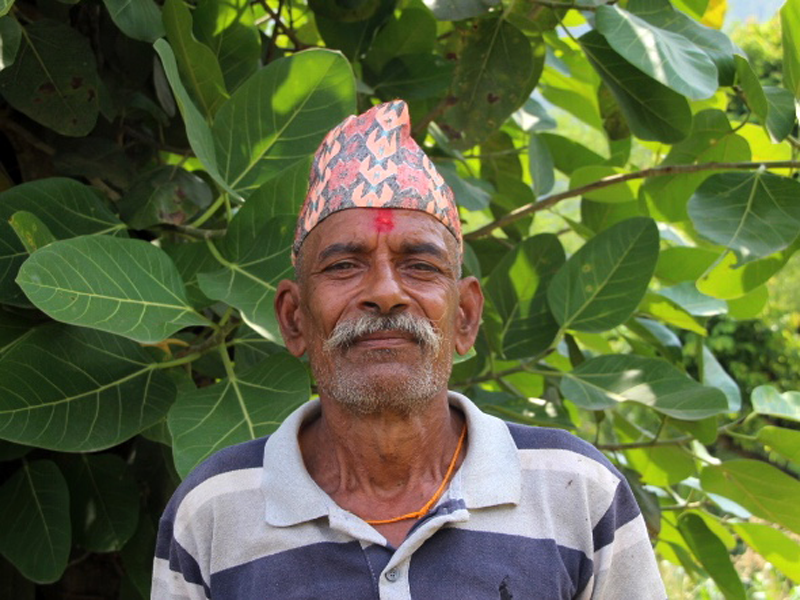

Hard Team Work Pays Off

Ram Parshad Panta, a Gajuri-based vegetable and animal farmer.
2019 © Astara van der Jagt
Among the first ten to form a group and loan from the Gajuri Small Farmers Agriculture Cooperative Ltd. (SFACL), Ram Parshad Panta, has had the opportunity to participate in many skill-oriented trainings that have helped him earn more capital than he said he ever had before. He has also been able to visit various villages in Dhading District for trainings and has been able to exchange ideas with other farmers.
The trainings offered information on various investments and money-saving methods he puts into practice. When he takes out a two-year loan, he clears it as fast as he can, then takes out another loan. To date, he has received several loans from the Gajuri SFACL and cleared every last one through investments and profits.
Having invested in both livestock and vegetable farming, he said he kills two birds with one stone through his animals’ production of feces, an organic fertilizer for vegetable crops. No spending on fertilizers means more money for his six children and their grandchildren.
Due to the loans he received from the Gajuri SFACL, he now makes between Nrs. 500,000 and Nrs. 600,000 per year. Despite this, he said he only saves Nrs. 500 per month, Nrs. 300 to Nrs. 400 more than before receiving the loans. This is because he has had to pay for the education of five of his children, his grandchildren, and his three daughters’ marriages.
Of his six children, three women and three men, only his eldest daughter did not attend school. This was because, at the time, there was no school in the area. The rest of his children graduated from high school, and his youngest daughter has a master’s degree.
Panta’s earnings have also gone to the construction of his house, where he lives with his wife and all his grandchildren, as well as the maintenance of the vegetable crops and his 17 goats, four cows and three buffalos that provide the whole family milk daily.

Clothes drying at Ram Parshad Panta's home in Gajuri.
2019 © Astara van der Jagt
His three sons, the eldest in the agricultural sector, the middle in the army, and the youngest, who’s working in Dubai, send money home whenever they can.

Counting down the days until Dashain Festival.
2019 © Astara van der Jagt
Money is most abundant, though, during the Dashain Festival. Traditionally known as Mwohni, the festival is one of Nepal’s most anticipated celebrations. Thousands of animals are sacrificed daily for 15 days. Hindus and Buddhist Newars believe that sacrificing them will liberate mankind of their sins, while simultaneously honouring the defeat of the Gods over evil demons.
Panta takes advantage of the occasion to sell some of his goats at a very costly price, after which they get sacrificed at the temple.

One of Ram Parshad Panta's goats.
2019 © Astara van der Jagt
Whereas his wife takes care of the grandchildren and household chores, Panta takes care of the animals, as well as the vegetable farm, which includes tomatoes and pumpkins. He carries 50 kg three kilometres to the mainroad everyday. It gets picked up and sold at various markets across the Kathmandu Valley. All of it usually gets sold, but Panta said it can be difficult to respond quickly to market demand.
Nevertheless, the loans offered through the Gajuri SFACL have enabled the Panta family to work together towards greater financial stability.

One of Ram Parshad Panta's new sheds.
2019 © Astara van der Jagt
Blog & Success Stories
-
One Gajuri Farmer Takes Advantage of Loans Given at Low Interest Rates
Nov 20, 2021 -
Managing On Her Own
Nov 20, 2021 -
Agriculture Empowers One Gajuri Family
Nov 20, 2021 -
"Everything I own, it's because of the support I received from Sana Kisan."
Nov 19, 2021 -
First Batch of Returnees Successfully Engage in Agricultural Entrepreneurship
Nov 19, 2021

